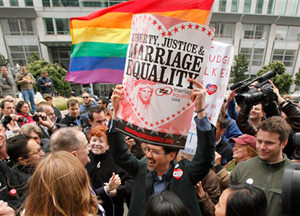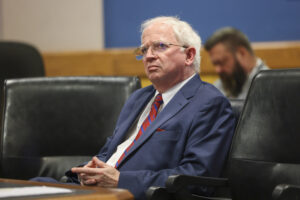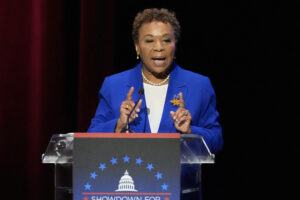Reason Beats Hate in Prop. 8 Ruling
When public discourse is so dominated by hysterical sound bites of religious intolerance and xenophobia, it is inspiring to read federal Judge Vaughn R. Walker’s ruling overturning Proposition 8, the California voter initiative banning same-sex marriage.Judge Walker’s careful, unemotional and thorough decision should provide the final argument for permitting same-sex marriages in California and the rest of the United States.
When public discourse is so dominated by hysterical sound bites of religious intolerance and xenophobia, it is inspiring to read federal Judge Vaughn R. Walker’s ruling overturning Proposition 8, the California voter initiative banning same-sex marriage.
His 136-page decision is marked by calm, tightly reasoned language—out of place in this blogger-cable-TV era—that leads, one paragraph after another, to his inevitable and absolutely correct conclusion:
“… [B]y every available metric, opposite-sex couples are not better than their same-sex counterparts; instead, as partners, parents and citizens, opposite-sex couples and same-sex couples are equal. Proposition 8 violates the Equal Protection Clause because it does not treat them equally.”
The fate of Walker’s decision is unclear. It is caught in a tangled and unfolding legal situation. On Monday, the U.S. Ninth Circuit Court of Appeals granted a request by Proposition 8 proponents to stay his order. The stay blocks same-sex marriages and will remain in effect until at least the first week of December, when the appeals judges will hear the case.
Judge Walker, known as a conservative judge, was nominated to the federal bench by President Ronald Reagan and confirmed during the presidency of George H.W. Bush. In February, San Francisco Chronicle columnists Phillip Matier and Andrew Ross wrote “[t]he biggest open secret” in the Proposition 8 trial is that Walker “is himself gay.” Walker declined to comment to the columnists. But shortly after Matier and Ross had spoken to him, a federal judge who considers himself a friend and confidante of Walker’s contacted the journalists. “He has a private life and he doesn’t want to conceal it, but doesn’t think it is relevant to his decisions in any case and he doesn’t want to bring it to bear in any decisions,” Walker’s friend said.
Obviously aware that his ruling will have to stand up under appeal, Walker used clear language and an abundance of legal citations and scholarship to back up his decision to toss out Proposition 8.
He cited history to strengthen his argument. History recalls a time when the nation still tolerated employment discrimination against gays and lesbians and entrapment arrests of gay men. That’s what was happening in the 1960s, while civil rights were being given to so many others.
In 1966, John Macy, chairman of the U.S. Civil Service Commission, was an example of the prevailing prejudice when he refused a request by the Mattachine Society to rescind the ban against the federal government hiring active homosexuals. Macy, in a letter cited by Judge Walker in his Proposition 8 decision, said he opposed the hiring of gays because of “… the apprehension caused other employees of homosexual advances, solicitations or assaults, the unavoidable subjection of the sexual deviate to erotic stimulation through on-the-job use of the common toilet, shower and living facilities, the offense to members of the public who are required to deal with a known or admitted sexual deviate. …”
The Mattachine Society, formed in Los Angeles in 1950, deserves its mention in a footnote in Walker’s ruling. It was a pioneering gay rights political organization and an early defender of gay legal rights. In a move that was courageous for the 1950s, the society went to court on behalf of a gay man entrapped by the Los Angeles police in a park, a notorious police tactic in those days. The case was dismissed. Moreover, a leading Mattachine Society founder, Harry Hay, in 1948 wrote a paper describing gays as an oppressed minority, then a revolutionary concept but today a central concept behind Walker’s ruling.
The judge went to considerable length in detailing how current law still is discriminatory. And giving same-sex couples the status of domestic partners does not right the wrong, the judge said.
“Domestic partnerships lack the social meaning associated with marriage, and marriage is widely regarded as the definitive expression of love and commitment in the United States,” he wrote. He also said that California domestic partnerships “may not be recognized in other states and are not recognized by the federal government.”
Same-sex couples are denied economic benefits, he noted. These include benefits from tax, property and inheritance laws, health insurance and social aid programs such as Medicare, Social Security and Medicaid. And the children of domestic partners are denied the “tangible and intangible benefits of having married parents.”
Walker also objected to the way Proposition 8 backers wrapped themselves in the cloak of religious morality. Prime supporters of the measure were the Catholic and Mormon churches. “Moral disapproval alone is an improper basis on which to deny rights to gay men and lesbians,” he wrote. “The evidence shows conclusively that Proposition 8 enacts, without reason, a private moral view that same-sex couples are inferior to opposite-sex couples.”
Taken together, these are powerful arguments for same-sex marriage. Its time has come. Massachusetts, Connecticut, Iowa, Vermont, New Hampshire and the District of Columbia all permit such unions. Judge Walker’s careful, unemotional and thorough decision should provide the final argument for permitting same-sex marriages in California and the rest of the United States.
In a political and media world of noise, his words were a testament to the power of thought, clarity and irrefutable logic.
Your support matters…Independent journalism is under threat and overshadowed by heavily funded mainstream media.
You can help level the playing field. Become a member.
Your tax-deductible contribution keeps us digging beneath the headlines to give you thought-provoking, investigative reporting and analysis that unearths what's really happening- without compromise.
Give today to support our courageous, independent journalists.






You need to be a supporter to comment.
There are currently no responses to this article.
Be the first to respond.